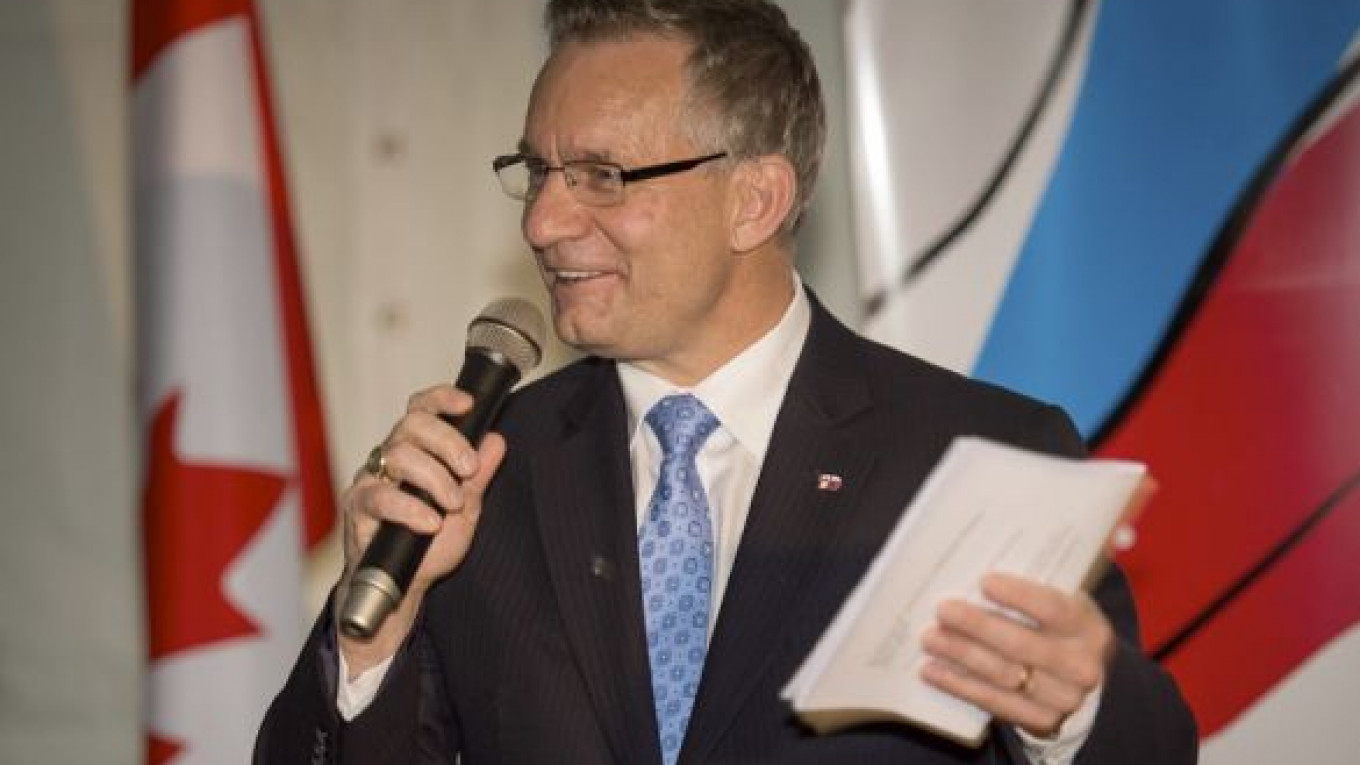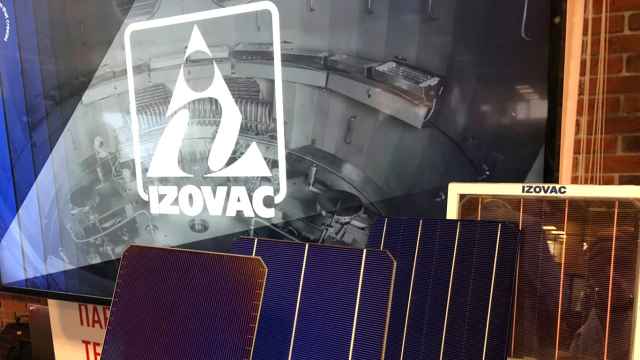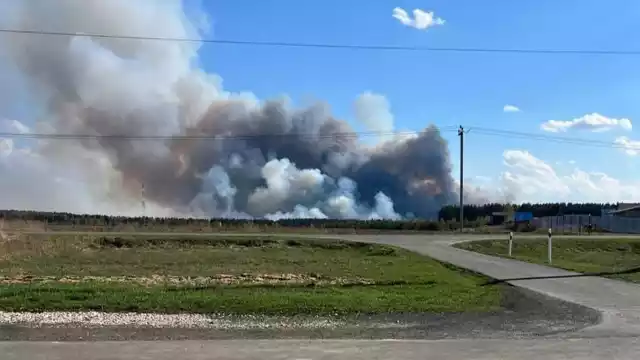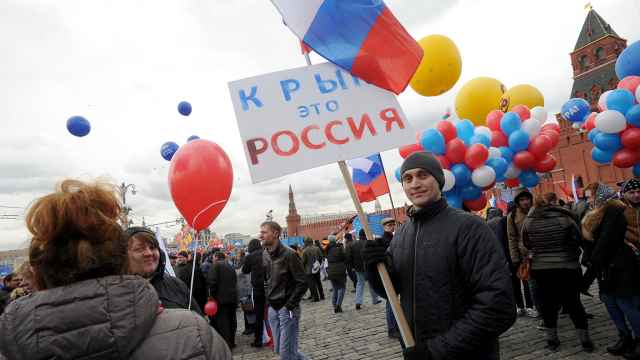Correction appended
As business leaders like Dmitry Solomin, CEO of Severstal's International Iron Beneficiation Group, and Mark Trevisiol, CEO and president of Silver Bear Resources, mingled under twin canopies in the garden of the Canadian ambassador’s residence, a sun-tanned man wearing a smart dark-blue suit stood alone, tapping out a message on his iPhone.
The man, the deputy head of a Russian government agency that issues permits for foreign companies working in natural resources, readily admitted to a reporter that he spoke no English. He also said that he was filling in for his boss at the reception, thrown for a trade mission led by Canada’s international trade minister, Ed Fast.
“I had expected formal speeches, not this,” he said, gesturing apologetically toward the throng of Canadian and Russian business executives swapping business cards as they nibbled on shish kebabs and sipped glasses of red wine on Wednesday evening.
He had forgotten his business cards. (But he gladly scrawled his cell-phone number and personal e-mail address on a slip of paper.) He spoke about his interest in assisting foreign investors in Russia. Then, glancing at his watch, he vanished just as Ambassador John Sloan stood up to introduce Minister Fast to the crowd.
The Russian official epitomizes a key hurdle that Fast faces as he works to deepen trade ties between Canada and Russia. Both sides appear eager and willing to cooperate, as illustrated by a $275 million trade finance partnership signed Thursday between Sberbank and Canada’s official export credit agency. But there seems to be a certain lack of connectivity and coordination.
Fast said these kinds of barriers were precisely why he came to Russia, the last of the four BRIC countries that he has visited as Canada seeks to reach free-trade agreements with a host of nations.
“Russia is one of Canada’s priority markets under our global commerce strategy,” he said in an interview in the ambassador’s residence after the reception.
While Canada has yet to estimate the possible benefits of a free-trade agreement with Russia, it forecasts that a deal with India would add $6 billion a year to its economy, and it is engaged in advanced talks with New Delhi. The government plans to conclude an agreement with the European Union by the year’s end and expects to see trade increase 20 percent, or by $12 billion per year, as a result.
The removal of trade barriers is essential for Canada’s economy, 64 percent of which comes from exports.
Fast said he received assurances during talks with Natural Resources and Environment Minister Sergei Donskoi that the government was intent on lowering barriers on subsoil and mining.
“He made it very clear that he welcomes more Canadian investment in the resources sector in Russia, and he did update me on some of the steps that the government here is taking to make those investments more attractive and more secure,” he said. “I see progress.”
President Vladimir Putin has named foreign investment as a priority, but his government has been fiercely protective of the country’s vast natural resources, which account for the lion’s share of Russia’s economy.
Asked what message he had for Canadian investors, Fast said: “I wouldn’t be doing my job if I didn’t say: ‘Canadians, listen. You are a cautious lot, but you do need to understand that there are some great opportunities in Russia. Do your homework. Do it right. Find the right partner in Russia, a trusted partner. But don’t close the door to this as an option.”
Russian investors are also welcome in Canada, he said, stressing that the country has a stable regulatory environment. “It is fair and predictable. We have rule of law,” he said.
He would not discuss specific cases of Russians being denied visas; Senator Mikhail Margelov was rejected without explanation in 2009, and billionaire Senator Vitaly Malkin has not been able to secure a visa for a decade because of Canadian government fears that he might have links to organized crime. But Fast said that steps were being taken to speed up the visa process for serious businesspeople.
Fast oversaw the signing of a deal Thursday in which Export Development Canada will provide $275 million in financing to Sberbank to support transactions where Sberbank customers buy Canadian supplies and services.
Also Thursday, the Interstate Aviation Committee awarded aircraft-type approval to Bombardier’s Q400 turboprop for operation in Russia and the CIS.
Executives from 30 Canadian companies accompanying Fast on the trade mission were upbeat about what they had seen in St. Petersburg and Moscow this week. The trip ends in Rostov-on-Don on Friday.
“I’m impressed,” said Pierre Meunier, an attorney who specializes in energy and environmental issues.
Milind Pimprikar, founder and chairman of CANEUS International, said the trip had helped shift perceptions that the country is filled with bureaucracy and corruption and Putin is aggressive.
“The best weapon is to work together with cooperation,” said Pimprikar, whose nonprofit organization coordinates the international development of micro-nano-technologies for of the aeronautics, space and defense communities.
Spotted among the guests at Wednesday’s reception was former Prime Minister Mikhail Kasyanov, now an opposition leader. “Canada is close to my heart,” he said in an interview, explaining that he had worked with the Canadians in the 1980s while drafting Arctic strategies for the State Planning Committee.
Fast also said Russia was special to him because his mother was born here, the daughter of Russian Mennonites. Although Fast doesn’t speak Russian, he found a parallel between his family history and his first visit to Russia this week.
In a speech at the reception, he said he was the product of Canadian-Russian relations and considered it an honor 57 years later to lead a trade mission to Russia to boost Canadian-Russian relations.
Correction: An earlier version of this article listed Dmitry Solomin as the CEO of Severstal, while his correct position is CEO of Severstal's International Iron Beneficiation Group.
A Message from The Moscow Times:
Dear readers,
We are facing unprecedented challenges. Russia's Prosecutor General's Office has designated The Moscow Times as an "undesirable" organization, criminalizing our work and putting our staff at risk of prosecution. This follows our earlier unjust labeling as a "foreign agent."
These actions are direct attempts to silence independent journalism in Russia. The authorities claim our work "discredits the decisions of the Russian leadership." We see things differently: we strive to provide accurate, unbiased reporting on Russia.
We, the journalists of The Moscow Times, refuse to be silenced. But to continue our work, we need your help.
Your support, no matter how small, makes a world of difference. If you can, please support us monthly starting from just $2. It's quick to set up, and every contribution makes a significant impact.
By supporting The Moscow Times, you're defending open, independent journalism in the face of repression. Thank you for standing with us.
Remind me later.






